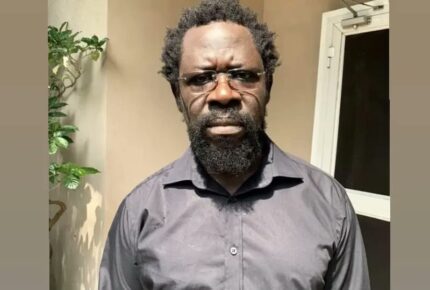Lawyer and activist Dele Farotimi has been embroiled in a high-profile legal confrontation following his arrest by Ekiti State police on allegations of defamation related to his book, ‘Nigeria and its Criminal Justice System’. The controversy centers around claims made about Afe Babalola, founder of Afe Babalola University, which prompted a criminal complaint leading to Dele Farotimi’s detention. Initially arraigned before a Magistrate’s Court in Ado Ekiti, Dele Farotimi faced potential imprisonment, with the court initially remanding him in custody and adjourning proceedings to December 10.
The case took a significant turn when the Inspector General of Police, Mr. Kayode Egbetokun, filed 12 counts of cybercrime against Farotimi, specifically targeting statements made in his book concerning Babalola. The allegations suggest that the published content potentially threatens public order, with legal teams meticulously dissecting the nuances of criminal defamation and its applicability under Ekiti State law.
Federal High Court Intervention: Dele Farotimi Bail Granted Under Strict Conditions
On Monday, Justice Babs Kuewumi of the Federal High Court in Ado Ekiti granted Farotimi bail under stringent conditions, requiring a N50 million bond with a surety of equivalent value. The bail stipulations mandate that the surety must be a resident of Ekiti State with verifiable landed property, and Farotimi must surrender his international travel passport to the court. This development marks a critical juncture in the legal proceedings, offering temporary relief to the embattled activist.
Dele Farotimi’s defense team, led by Prof. Sylvester Emiri (SAN), successfully argued for bail despite vigorous opposition from the police counsel, Mr. Samson Osobu. Lawyer Ralph Nwoke confirmed that an oral bail application was immediately moved upon receiving the amended charges, highlighting the legal team’s swift and strategic response to the evolving case.
Competing Narratives: Defamation Claims and Counter-Claims
The legal dispute revolves around Dele Farotimi’s alleged statements in his book, which purportedly suggest corruption involving Supreme Court justices. The Justice for Afe Babalola Legacy (JABL) group has vocally demanded that Farotimi provide evidence for his claims or face legal consequences. Rotimi Opeyeoluwa, JABL’s Publicity Secretary, emphasized the need to protect Babalola’s reputation and seek comprehensive fact-finding.
Farotimi’s legal team contends that criminal defamation is not a recognized offense under Ekiti State criminal law, setting the stage for a complex legal argument. Lawyer Ayodele Ademiluyi stressed that the charges primarily relate to potentially disruptive online information, with Farotimi maintaining his innocence by pleading not guilty to the amended charges.
Community and Political Dimensions: Tensions and Warnings
The case has broader social implications, with local community leaders like Chief Michael Osaloni issuing stern warnings against potential protests. Osaloni, the Olotin of Ado Ekiti, cautioned potential demonstrators about the consequences of challenging Babalola’s reputation, suggesting potential local resistance to public demonstrations supporting Farotimi.
The ongoing legal battle highlights the intricate intersections of media, reputation, and judicial processes in Nigeria, with significant potential implications for press freedom, academic discourse, and the boundaries of public criticism. As the case continues, legal observers and civil society will likely monitor its progression closely, recognizing its potential precedent-setting nature. :::Legal and Public Implications
This high-profile case has sparked widespread debates on freedom of speech, defamation laws, and the judiciary’s role in balancing these interests. Farotimi’s defense team maintains that his comments were within the bounds of free expression, challenging the legitimacy of the charges under Ekiti State laws.
Meanwhile, critics argue that the allegations tarnish Afe Babalola’s legacy, demanding accountability. As proceedings continue, the case highlights the tension between free speech and reputational protection in Nigeria’s legal landscape. Farotimi is set to reappear before the Magistrates’ Court on Tuesday, with both sides gearing up for a legal battle that could set significant precedents.
Table of Contents
Discover more from OGM News NG
Subscribe to get the latest posts sent to your email.














